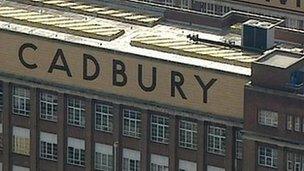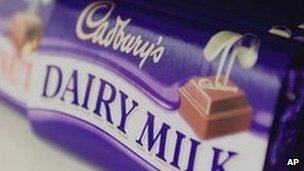Kraft and Cadbury: How is it working out?
- Published
Cadbury is cutting 200 jobs, yet also investing £50m at various plants in the UK. As a delegation of MPs visits its home in Bournville, Birmingham, the BBC looks at how the takeover by US owners Kraft Foods is working out.

Kraft said £13.5m would be invested at Bournville
It did not start well.
When it was taking over Cadbury, US food firm Kraft promised to keep open the chocolate firm's Somerdale factory near Bristol.
But soon after the deal was done, Kraft announced a U-turn and shut the factory that employed 400 staff.
Now, nearly two years on since the hostile takeover in February 2010, the firm has announced a further 200 job cuts, but also £50m investment.
The announcement came in the week members of Parliament's Business, Innovation and Skills Select Committee are visiting the Cadbury Bournville plant.
It is a follow-up to their May report called Is Kraft working for Cadbury?, external
Committee chair Adrian Bailey, MP for West Bromwich West, said the visit was part of its commitment to "monitor the pledges that the management had made to the employees of Cadbury in terms of investment".
It was arranged before Kraft's announcement about jobs and extra investment but Mr Bailey said they would be taking the opportunity to talk to them about the plans.
"We will be pressing them to ensure that this investment will continue and that Cadbury will continue to develop new product lines and expand for the benefit of everybody," Mr Bailey added.
The 200 jobs will go at Bournville, Chirk in Wrexham, north Wales, and Marlbrook in Herefordshire and will be made through redeployment and voluntary redundancies, the firm said.
Investment 'crucial'
Unite union convener at Bournville, John Flavin, said "we will be working hard to actually mitigate the job losses".
"We're very pleased about the investment, but obviously the price that the workforce will have to pay, we can't really understand and we need more detail exactly how the company is going to achieve this."
Labour MP for Selly Oak in Birmingham Steve McCabe, whose constituency includes Bournville, said he was sorry to hear about any job losses but welcomed a £13.5m investment in the plant.

Kraft took over Cadbury in 2010
"I think the investment is what's crucial to the long term future," he added and pointed out that Kraft had also expanded the research and development section.
"I think Kraft has behaved quite well in respect of Bournville, they honoured the two-year agreement about no redundancies, there have been two quite good pay settlements at a time when some people are taking pay cuts."
Colin Bates, a retired senior engineer from Marden who worked at the Marlbrook plant, was pleased to hear about a £2.6m investment there.
"I'm quite happy that Kraft are doing the right thing," he said.
"As far as the future is concerned in terms of Marlbrook and its production, I'm reasonably confident that the numbers that they're going to take out of Marlbrook will be quite small and so I think its definitely going to remain for some time to come."
'Fears addressed'
Tony Bilsborough, from Kraft Foods UK, said a commitment they made about jobs in 2010 had "held true".
"The commitment made in March 2010 was there'd be no compulsory redundancies in manufacturing for two years and that position still stands.
"This latest announcement relates to the period from March 2012 until March 2014," he said.
In terms of closing the factory at Somerdale, Mr Bilsborough said "the statement was given in good faith at the time although based on very limited information".
Acknowledging the concerns some people had in 2010 about the takeover, Mr Bilsborough said fears that it would be the end of Cadbury "have simply not turned out to be true".
He said they were "understandable fears and we hope we've addressed those fears".
- Published6 December 2011
- Published16 September 2011
- Published4 August 2011
- Published23 May 2011